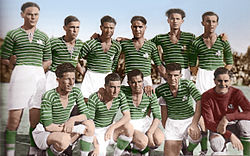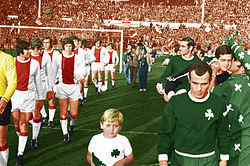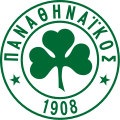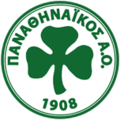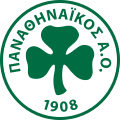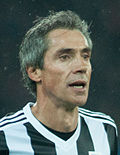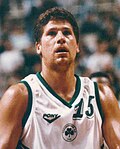This article needs additional citations for verification .(March 2024) |
 | |
| Full name | Παναθηναϊκός Αθλητικός Όμιλος Panathinaikós Athlitikós Ómilos (Panathenaic Athletic Club) |
|---|---|
| Nicknames | Οι Πράσινοι (the Greens) To Τριφύλλι (the Trifolium/Trefoil) Σύλλογος Μεγάλος (The Great Club) |
| Founded | 3 February 1908 as Podosferikos Omilos Athinon (117 years, 352 days old) |
| Based in | Athens, Greece |
| Colours | Green, White |
| Anthem | Syllogos Megalos (Great Club) |
| Chairman | Dimitris Vranopoulos |
| Titles | Intercontinental Titles: (1) European Titles: (9) Balkan Titles: (1) |
| Website | pao1908.com |
Panathinaikos Athlitikos Omilos (Greek : Παναθηναϊκός Αθλητικός Όμιλος, lit. 'Pan-Athenian Athletic Club') also known as Panathinaikos A.C. [1] , or simply as Panathinaikós [panˈaθinai̯ˈkos] , is a major Greek multi-sport club based in the City of Athens. Panathinaikos is one of the most successful multi-sport clubs and one of the oldest clubs in Greece. The name "Panathinaikos" (which can literally be translated as "Panathenaic", which means "of all Athens") was inspired by the ancient work of Isocrates Panathenaicus, where the orator praise the Athenians for their democratic education and their military superiority, which use it for benefit of all Greeks. [2]
Contents
- History
- 1908–1945
- 1946–1990
- 1991–2000
- 2001–present
- Crest
- Crest evolution
- Description and major titles of the professional departments
- Panathinaikos men's football
- Panathinaikos men's basketball
- Description and major titles of the amateur departments
- Panathinaikos women's basketball
- Panathinaikos men's volleyball
- Panathinaikos women's volleyball
- Individual sports
- Panathinaikos athletics
- Panathinaikos cycling
- Panathinaikos table tennis
- Panathinaikos boxing
- Panathinaikos fencing
- Panathinaikos archery
- Panathinaikos shooting
- Panathinaikos diving
- Panathinaikos swimming
- Panathinaikos weightlifting
- Panathinaikos modern pentathlon
- Panathinaikos wrestling
- Panathinaikos chess
- Panathinaikos People with Disabilities
- Panathinaikos wheelchair basketball
- Panathinaikos wheelchair fencing
- Notable athletes
- Supporters
- Notable supporters
- Gold trifolium
- European and worldwide honours
- Gallery
- See also
- References
- External links
It was founded by Giorgos Kalafatis in 1908 as a football club, when he and 40 other athletes decided to break away from Panellinios Gymnastikos Syllogos following the club's decision to discontinue its football team. It is amongst the most popular clubs in the country and one of the biggest worldwide, based on the number of its sports departments. It is the club that introduced in Greece a number of sports, as it was the first, or amongst the first teams, in football, basketball, volleyball, field hockey, table tennis and handball, while they were also pioneer in the creation of women's teams in basketball and football.
Panathinaikos' teams and individual athletes have won numerous titles and have made notable participations in domestic and international competitions. The basketball team of the club is the most successful in Greece and one of the most successful in Europe, with seven European championships, one Intercontinental Cup and two Triple Crowns. The football team of Panathinaikos are the only Greek team that has reached the UEFA Champions League final (in 1971) and also the semi-finals twice (in 1985 and 1996). It is also the only Greek football team that has played for the Intercontinental Cup. The teams of Panathinaikos have played overall in 18 European and international finals (in football, basketball, men's volleyball, women's volleyball, men's table tennis and women's table tennis).
In the individual sports, Panathinaikos has a remarkable tradition in the athletics, cycling, shooting, fencing and boxing departments. It has produced numerous athletes; World champions and European champions, winners at the Olympic, Mediterranean and Balkan Games.

